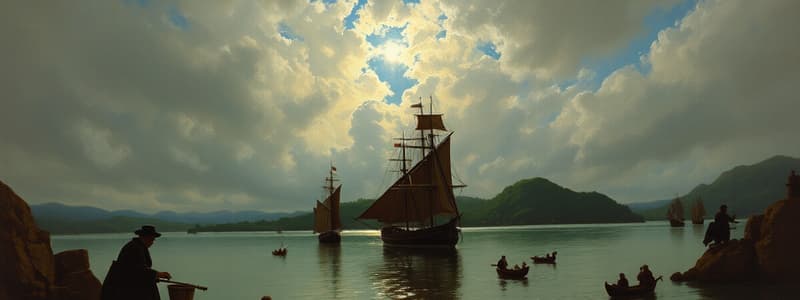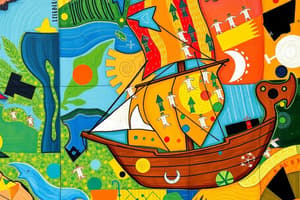Podcast
Questions and Answers
The Treaty of Tordesillas was established in 1494 to divide the land between Spain and France.
The Treaty of Tordesillas was established in 1494 to divide the land between Spain and France.
False (B)
The red vertical line in the Treaty of Tordesillas specifically cut through eastern Brazil.
The red vertical line in the Treaty of Tordesillas specifically cut through eastern Brazil.
True (A)
The Persian Astrolabe was used as a navigational tool in exploration during the 1650s.
The Persian Astrolabe was used as a navigational tool in exploration during the 1650s.
False (B)
The Mariner’s Compass was invented in the year 1570.
The Mariner’s Compass was invented in the year 1570.
The explorations conducted by Spain and Portugal had no impact on the indigenous communities in the Americas.
The explorations conducted by Spain and Portugal had no impact on the indigenous communities in the Americas.
The Age of Exploration primarily focused on finding new trade routes to spices.
The Age of Exploration primarily focused on finding new trade routes to spices.
The Moluccas were known as the 'Spice Islands' due to their abundant supply of spices.
The Moluccas were known as the 'Spice Islands' due to their abundant supply of spices.
Explorers during the Age of Exploration aimed to eliminate all foreign influences on native cultures.
Explorers during the Age of Exploration aimed to eliminate all foreign influences on native cultures.
The spirit of adventure was irrelevant to explorers during the Age of Exploration.
The spirit of adventure was irrelevant to explorers during the Age of Exploration.
The belief in logic and reason contributed to the development of social sciences during the Age of Exploration.
The belief in logic and reason contributed to the development of social sciences during the Age of Exploration.
Europe's high demand for Eastern goods was one of the main motivations for exploration.
Europe's high demand for Eastern goods was one of the main motivations for exploration.
The main economic choice during the Age of Exploration was to remain isolated without engaging in trade.
The main economic choice during the Age of Exploration was to remain isolated without engaging in trade.
Conversion to Christianity was a motive for explorers during the Age of Exploration.
Conversion to Christianity was a motive for explorers during the Age of Exploration.
Flashcards are hidden until you start studying
Study Notes
Age of Exploration Overview
- Era marked by European exploration for new trade routes, wealth, and knowledge.
- High demand for Eastern goods, especially spices, fueled exploration efforts.
- Spices sourced mainly from the Moluccas, known as the "Spice Islands" in present-day Indonesia.
Motivations for Exploration
- Quest for new trade routes to engage in the Spice Trade and reduce intermediaries.
- Desire to convert indigenous populations to Christianity.
- Intention to learn about new territories and cultures.
Technological Advancements
- Use of navigational tools like the Persian Astrolabe (1650), Mariner’s Compass (1570), and Carta Marina (1516).
- Innovations in ship design such as the Caravel, enhancing exploration capabilities.
Cultural and Economic Impacts
- Emergence of cultural diversity resulting from the Age of Exploration and Trade.
- The exploration led to the exploitation and significant cultural changes in indigenous populations.
- Scientific and technological advancements transformed goods production, promoting economic growth.
Treaty of Tordesillas
- Signed in 1494 to split the "New World" between Spain and Portugal.
- A red vertical line through eastern Brazil represented the territorial boundary.
- The treaty favored Spanish and Portuguese empires while negatively impacting 50 million indigenous inhabitants.
Ethical Considerations
- Exploration raised ethical dilemmas regarding explorers' responsibilities to indigenous lands and peoples.
- Discussions on whether cultures should remain intact and the influence of exploration on societies continue today.
Discussion Points
- Exploration intent varied by nation, with Spain and Portugal leading efforts.
- Effects of exploration had long-lasting consequences for the colonizers and the indigenous communities.
- Modern parallels can be drawn between historical ethical dilemmas and contemporary global challenges.
Studying That Suits You
Use AI to generate personalized quizzes and flashcards to suit your learning preferences.




